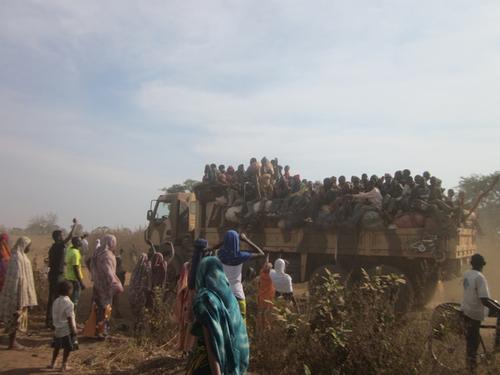As the cycle of retaliatory violence continues to escalate in Central African Republic (CAR), so too does the number of people fleeing the country in the last weeks. Overall, it is estimated that between 80,000 and 100,000 refugees have now fled to Cameroon, Chad, Congo Brazzaville and the Democratic Republic of Congo (DRC).
In addition to its emergency programs in CAR itself, MSF has now mobilised emergency teams in Cameroon, Chad and DRC and is currently conducting assessments in Congo-Brazzaville.
Cameroon
In eastern Cameroon, more than 22,000 refugees have crossed the border in recent weeks, around 9000 of whom arrived in the first ten days of February. Refugees are arriving in a fatigued state, having walked for kilometres and eating only what they can find on the way.
“The people we see here are very weak physically and mentally, and they are traumatised,” said Sylvain Mathieu, MSF’s emergency coordinator in Cameroon. “Sometimes patients burst into tears during their medical consultation.”
MSF has just started providing primary healthcare to refugees crossing the border at the Garoua-Boulaï crossing point. At present, there are an estimated 4,500 refugees in Garoua-Boulaï. Other large groups of people are spread around several locations, and MSF expects more people to continue crossing the border as the conflict in CAR continues. Teams are providing around 900 consultations per week, and are seeing many cases of malaria among children, as well as respiratory infections.
Alongside the Cameroon Ministry of Health and other organisations, MSF is also treating cases of severe malnutrition. Teams will soon start activities in a transit camp in Borgogné, 45km from Garoua-Boulaï. Two other transit camps are also being set up in the Adamaoua region, north of Garoua-Boulaï.
Chad
In southern Chad, around 35,000 people travelling by truck and foot have arrived over the last weeks. Mostly women and children, many have travelled more than 200 kilometres, and arrive in an exhausted state. MSF has started providing medical care in Bitoye, a town 10 km from the border. Bitoye has grown 50% in size since the arrival of the refugees and services are stretched to the limit. There has been just one food distribution in more than a week, there are no latrines, and drink water is in short supply. In just three days, MSF saw 19 children with severe acute malnutrition. The main illnesses patients are presenting with are malaria, diarrhoea and respiratory infections. severe cases are being referred to Baibokoum Hospital, 25 kilometres away.
“The refugees who had resources came by truck, with a few personal possessions, and the others walked,” said Anthony Thouvenin, emergency coordinator for MSF at the Chad-CAR border. “They have nothing. There are also approximately 50 children who arrived alone.”
MSF is also working further east in Sido, where 8,500 refugees have gathered, and thousands more are expected to arrive. On 9 February, MSF received 150 patients. The team has also already identified 12 victims of sexual violence.
Democratic Republic of Congo
In the north of DRC, refugees have been arriving to Zongo since March, fleeing the violence in CAR’s capital, Bangui. Official figures say that there are currently 60,000 refugees from CAR in the country, most of them along the border in Equator and Orientale Provinces. Around half are living in four refugee camps, and the other half are with host families.
“I find it difficult to get food here, but I am lucky to have a host family welcoming me and my three kids,” says Paulette, a 27 year old woman who has fled CAR. “I have known this family for a long time, they came to our place in Bangui when there were some clashes in DRC in 1996. Here, I work in the fields and eventually get enough money to buy some food. We need food. And we have health issues, and I don’t have the money to go to the doctor with my children.”
After having supported the General Reference Hospital in Zongo with medical donations in March, MSF is now supporting the paediatrics department. Between 27 January and mid-February, MSF treated 167 children, most of them suffering from severe malaria or malnutrition. Teams are also conducting mobile clinics along the Ubangui River, very close to Bangui. In its mobile clinics in Sambolola, MSF provided medical care to 810 patients in seven days, 40% of the patients coming from Bangui.
Congo-Brazzaville
In Congo-Brazzaville, it is estimated that between 10,000 and 12,000 refugees have crossed the border, staying within the communities and in the bush. MSF is currently assessing the situation to determine an appropriate response.
In response to the recent violence in CAR, MSF now runs six emergency projects in Bangui, Bouar, Bozoum, Bossangoa, Bangassou and Berberati. The organisation also runs eight regular projects in Batangafo, Boguila, Carnot, Kabo, Ndéle, Paoua, Bria and Zémio, and has around 240 international staff and over 2000 local staff working in the country.



